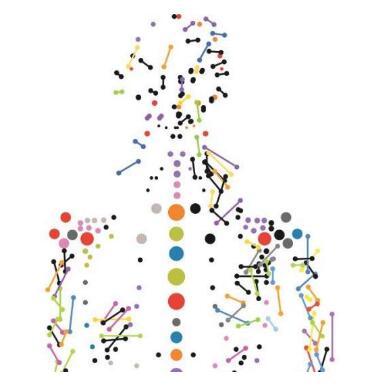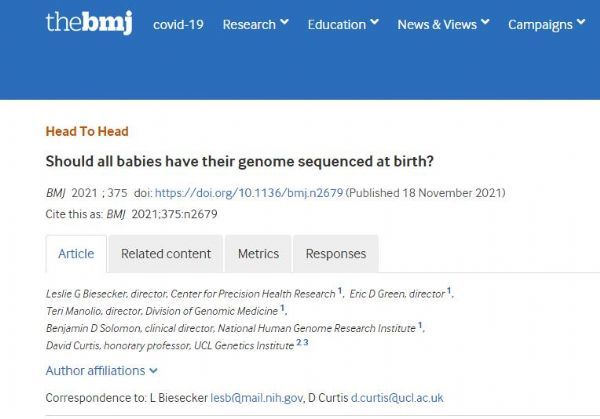BMJ: Should all babies undergo genome sequencing at birth?
- Normal Liver Cells Found to Promote Cancer Metastasis to the Liver
- Nearly 80% Complete Remission: Breakthrough in ADC Anti-Tumor Treatment
- Vaccination Against Common Diseases May Prevent Dementia!
- New Alzheimer’s Disease (AD) Diagnosis and Staging Criteria
- Breakthrough in Alzheimer’s Disease: New Nasal Spray Halts Cognitive Decline by Targeting Toxic Protein
- Can the Tap Water at the Paris Olympics be Drunk Directly?
BMJ: Should all babies undergo genome sequencing at birth?
- Should China be held legally responsible for the US’s $18 trillion COVID losses?
- CT Radiation Exposure Linked to Blood Cancer in Children and Adolescents
- FDA has mandated a top-level black box warning for all marketed CAR-T therapies
- Can people with high blood pressure eat peanuts?
- What is the difference between dopamine and dobutamine?
- How long can the patient live after heart stent surgery?
BMJ: Should all babies undergo genome sequencing at birth?
Recently, in a research report titled “Should all babies have their genome sequenced at birth?” published in the international journal BMJ, scientists from the National Institute of Human Genome Research and other institutions debated this topic.
Genomics England, a government-owned company, recently announced a pilot program for whole-genome sequencing, which is to conduct 200,000 seemingly healthy newborns.
Research and screen for hereditary diseases. So the question is, should whole-genome sequencing be performed for every newborn?
Recently, in a research report titled “Should all babies have their genome sequenced at birth?” published in the international journal BMJ , scientists from the National Institute of Human Genome Research and other institutions debated this topic.

Image source: CC0 Public Domain
Researcher Leslie Biesecker said that a large amount of clinical evidence shows that screening for genetic diseases can help save lives, and it is also cost-effective.
Routine genome sequencing of newborns will eventually be carried out, but this is not a screening of newborns for all diseases.
Researchers advocate a phased promotion, that is, genome sequencing at the birth of the individual. Mutant analysis is carried out in order at age, thereby helping to reduce the burden of genetic diseases.
The researchers explained that the promotion of such genomic information should be guided by regulatory agencies and carried out with informed consent and appropriate withdrawal.
At the same time, it can also exist in the repository associated with individual medical records and be available to healthcare at any time. Provided by the provider, and can be re-analyzed based on growing knowledge.
In order to achieve the expected benefits of conventional newborn genome sequencing, researchers stated that they need to make progress in multiple areas, including data quality, appropriate information management, and clinical decision support systems; but they refused to require all non-genetics professional health care The staff accepts the call for extensive genetics and genomics training, and believes that this is impractical and unnecessary.
Researchers believe that only by sequencing a person’s entire genome early in life can the full potential of genome diagnosis be realized, and it can provide a certain opportunity for faster and more accurate diagnosis, and can be targeted and based on the smallest delay.
The gene therapy is brought to the patient’s bedside. By having a healthy ecosystem that provides universal and available routine newborn genomic screening, researchers can learn to the maximum and ensure that the benefits of genomics reach the widest range of populations and minimize differences.
Bring greater health to all. University College London researcher David Curtis pointed out that a person’s genome includes a large amount of personal data.
We have no reason to show that all citizens can get relevant information before they are old enough and have the ability to provide informed consent.

Image source: https://www.bmj.com/content/375/bmj.n2679
Only a very small number of genetic diseases need to be tested before the individual agrees to be screened, and there are currently procedures for screening and testing newborns with rare and serious diseases.
The researchers explained that genome sequencing can also provide information on the risk of disease for many diseases for which there is no specific intervention, but even if some adults are very interested in obtaining this risk information, there is no reason to Situation to assess the risk of future health problems.
In this article, the researchers cited examples of the potential benefits of genome sequencing of newborns to society, but this may not be a reason for sequencing the genomes of infants.
In the article, the researchers also raised concerns about the possible misuse of personal data.
They pointed out that some governments are conducting large-scale DNA collection and may use it for some violations.
So why do we need to sequence the genome of babies? Because it does not have a say in this issue, and currently we have not agreed to allow all adults to accept this process, because for them, the potential health benefits seem to be much greater.
So should all adults undergo genome sequencing? If the answer is no, the scientific community should limit medical testing of newborns to a few cases, because everyone believes that testing will bring real benefits to them.
Reference:
Leslie G Biesecker,Teri Manolio,Benjamin D Solomon, et al. Should all babies have their genome sequenced at birth? BMJ (2021). DOI:10.1136/bmj.n2679
BMJ: Should all babies undergo genome sequencing at birth?
(source:internet, reference only)
Disclaimer of medicaltrend.org
Important Note: The information provided is for informational purposes only and should not be considered as medical advice.



